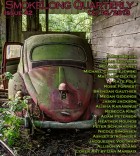This story breaks my heart on several levels. Tell me, do things work out for this woman? And her son? And her husband? Because I’m rooting for all of them.
I haven’t written that story yet, but I do think things work out for her. She doesn’t keep her house, but she does rebuild a different sort of life for herself and her child. She’s a survivor. I’m interested in survivors, in people who don’t quit, women especially. The strongest people I know are women. They may fail and screw up and stand on the edge of the abyss, but they find a way around it or through it. That’s interesting to me.
If you were living in the back of a movie theater, what five physical objects from your current life would you bring with you?
I hope this list isn’t too boring. Running shoes; a notebook and a felt tip pen; my fuzzy blue socks; my goldfish, I have two in a round bowl. Their names are Sparkles and Bubbles, courtesy of my eight-year-old daughter. One of them, we won at the carnival and it’s impressive that he (or she) has lived as long as she has—two years! Usually those carnival fish die in a few days. And, lastly, a huge anthology of stories, something like The Story and Its Writer, which I love not just for the stories, but for the author interviews and essays in the back. It would be hard to limit myself to just one writer, so an anthology would be the way to go.
Let’s talk about last lines—because this one blew all our editors at SmokeLong away. How did you come to this one, which seems so perfect and understated and unpredictable and everything else that makes a great last line?
Accidentally. Like most of my stories, I had no idea where this one was going. I wrote the line about the fake signature and then I wrote another paragraph that wasn’t very good. I was tempted to write more, to elaborate, and then I realized that what it needed was not more, but less. So I cut out the last paragraph and ended with the line about the signature. That last line was a gift, especially because I have a hard time with endings and often agonize over them. The ending of this story surprised me, too, the way it put the woman’s situation into stark perspective. It made think of what Robert Frost said, “No surprise for the writer, no surprise for the reader.” I had a much harder time getting the opening paragraphs right. I rewrote the first two paragraphs at least fifteen times.
This story is in second person, which we see a lot of at SmokeLong. Often, we will reject a story because it doesn’t seem like it needs to be in second person, or isn’t working in that point of view. This story, however, seems to strike a perfect chord. What do you think about second person point of view? Do you enjoy writing it/reading it? Am I the only one who ponders such things?
You are not the only one who ponders such things! To be honest, this is the only story I’ve ever written in the second person pov. I think it’s tough to do well, and probably best done in small doses. But you’re right—if you’re going to employ the second person, you should have a compelling reason to do so because it calls attention to itself. All of my work is in the first or third person. I’m not as interested or drawn to experimental forms. What I’m really interested in is good old fashioned storytelling, characters, and language. That said I admire many of the more experimental forms out there and often wish I could write that way.
This particular story came out of an essay I was writing about the housing crash. Somehow in the middle of a very different type of writing another voice and characters emerged, and I realized it was a totally separate thing. I just went with it. So I didn’t sit down and say “I’m going to try writing in the second person.” It just came.
You recently had your first short story published. Can you talk some about your writing career—do you write mostly poetry? What are you working on now?
My writing career! I’m working on a collection of stories called Siblings. The stories take place in different time periods, with different characters and dilemmas, but the common thread running through all of them is the sibling relationship, which has always fascinated me probably because my mother grew up with three sisters and two brothers and those relationships have often been fraught with tension, but also a lot of love. No one can know you in the same way that your sibling does. Two of the stories in that collection have been published. I’m hoping to get a few more published soon, and the others are a work in progress.
I’m also working on a novel, but that’s been slow going. Writing a novel is like participating in a boxing match. You kind of need someone in your corner to coach you along, or to wipe the sweat and blood from your brow.




 Included in the price of SmokeLong Fitness:
Included in the price of SmokeLong Fitness: